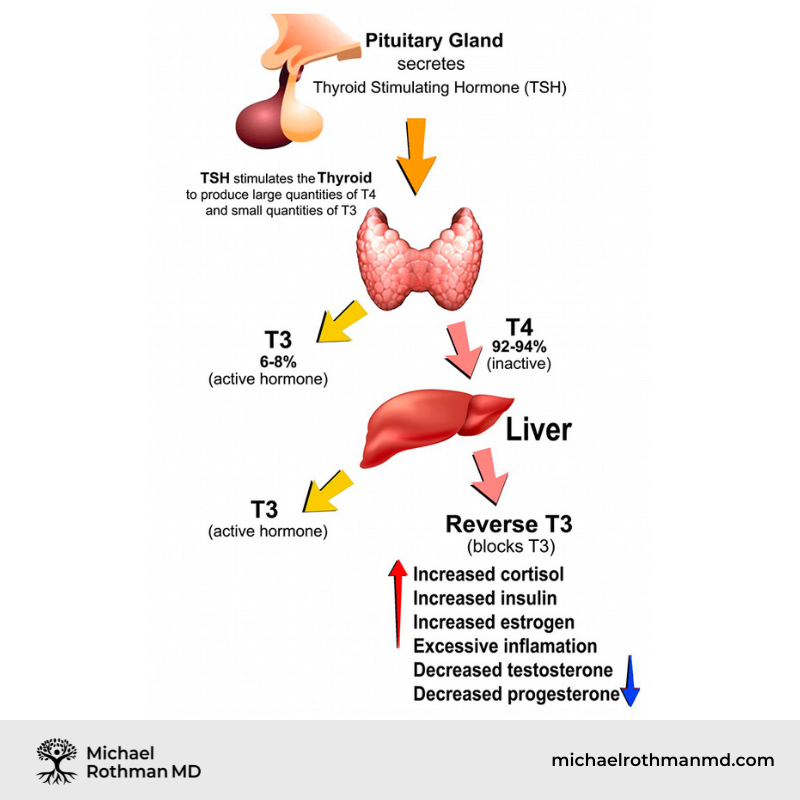Thyroid Disease
Metabolically Directed Approach to Thyroid Problems
- Fix what is wrong
- Consider dietary, environmental, hormonal, immune, metabolic factors when assessing and treating thyroid problems
- Metabolic imbalances including acid-base imbalances, autonomic nervous system imbalance, anabolic-catabolic imbalance, electrolyte imbalance can affect thyroid functioning
Undiagnosed and Poorly Treated Thyroid problems
- A significant percentage of the general population is suffering from thyroid disease without any knowledge of their problem
- Diseases of the thyroid gland can result in hypothyroidism (too little thyroid hormone) or hyperthyroidism (too much thyroid hormone)
- Thyroid nodules and goiter are also seen in a significant number of patients
Conventional Diagnosis of Thyroid Disease
- Very flawed
- Overly dependent on TSH and Free T4 levels
- Lab ranges are much to broad to be clinically useful
- For example – the “normal range” for TSH is usually 0.45 to 4.50, yet substantial scientific evidence shows that once your TSH exceeds 2.5, many metabolic problems are evident
- These documented metabolic changes include high LDL cholesterol, low HDL cholesterol, rising blood sugar levels and weight gain
Conventional Treatment of Thyroid Disease
- Very flawed
- Most practitioners are too focused on TSH (a pituitary hormone) and not focused enough on the levels of active, inactive, bound and unbound thyroid hormones
- Not focused on using metabolic, functional and symptomatic clues of thyroid disease and dysfunction
- Overly reliant on T4 (inactive) only forms of thyroid hormone in treating patients, while often failing to utilize T3 (active) when appropriate
Common Hypothyroid Related Symptoms
- Constipation
- Gas and bloating
- Brain fog
- Chronic fatigue
- Weight gain
- Depression
- Insomnia
- Cold Intolerance
- Anxiety
- High LDL cholesterol
- Low HDL cholesterol
- Edema
- Muscle aches and spasms
- Many more
Thyroid Metabolism is Really a Bit More Complicated
- There are at several forms of thyroid hormone that need assessment for a proper workup
- TSH (actually a pituitary hormone)
- Free and Bound Levothyroxine (free T4 and total T4)
- Free and Bound Liiothyronine (free T3 and total T3)
- Reverse T3
Simplified Model of Thyroid Metabolism

Thyroid Related Antibodies
- Immune related thyroid issues are commonly overlooked.
- In hypothyroid states – assessment of thyroid peroxidase and thyroglobulin antibodies should be measured
- In hyperthyroid states – assessment of thyroid stimulating immunoglobulin (TSI), thyroid stimulating hormone receptor antibodies (TSHRab), thyroid binding inhibitory immunoglobulin (TBII) should be measured
Other Labs Affected by Abnormal Thyroid Function
- Mean Corpuscular Volume (MCV) – often elevated in hypothyroid states
- Alkaline phosphatase – may be low in hypothyroid states and high in hyperthyroid states
- Ferritin – may be low in hypothyroid states and high in hyperthyroid states
- LDL cholesterol – may be elevated in hypothyroid states
- HDL cholesterol – may be low in hypothyroid states
- Liver tests (AST and ALT) – may be elevated in hyperthyroid states, may be low in hypothyroid states
Other Factors to Consider in Assessing Thyroid Dysfunction
- Dietary issues – goitrogens – compounds that interfere with normal thyroid function (cruciferous vegetables and soy based products)
- Influence of sex hormones, adrenal hormones, insulin, chronic inflammation
- Iodine deficiency and exposure to halogens that interfere with iodine metabolism (bromine, chlorine, fluorine)
Polyunsaturated Fatty Acids can Impair Thyroid Function
- Also known as PUFA
- Found in many commercial foods
- Frequently found in salad dressings and mayonnaise
- Almost always found in margarine and butter substitutes
- Metabolic Poisons
- Examples are Canola oil, soy oil, corn oil, safflower oil, sunflower oil
Saturated Fats Have no Double Bonds,
They are very Stable and enhance Thyroid Function

Unsaturated Fats Have Double Bonds
They are
Unstable and Tend to Impair Thyroid Function

Undiagnosed or Poorly Treated Thyroid Problems are very Common
- Myth – “All my thyroid labs are within normal limits” means “there is nothing wrong with my thyroid”
- Fact – The ranges for thyroid hormones (and many other ranges) by definition are based on a statistical analysis such that 95% of all patients will always be within the “normal” range.
There are Several Available forms of Thyroid Hormones in Addition to T4 (levothyroxine)
- T4 = levothyroxine, four iodine molecules, also known as Synthroid, most commonly prescribed thyroid hormone. NOT the active form of thyroid hormone
- T3 = liiothyronine, 3 iodine molecules, also known as Cytomel, rarely prescribed by primary care doctors and endocrinologists. THE active form of thyroid hormone
- RT3 = Reverse T3, a mirror image of T3. BLOCKS T3 effectively putting the brakes on the active hormone by blocking the T3 receptor. Rarely measured by primary care doctors and endocrinologists
- Natural forms of thyroid hormone (dessicated porcine hormone)
- Gluten free T4 = Tirosint
- Gluten free T3 – not commercially available – needs to be compounded
- Gluten free dessicated procine thyroid hormone – available commercially as NP thryoid or can be compounded
Significant Percentages of Thyroid Patients are Inadequately
Treated with Inappropriate Medications
- T4 only Thyroid Hormones are inactive and must first be activated by your liver and peripheral tissues to be biotransformed to T3 (active)
- Many people, do not properly bio-transform T4 to T3 and make significant amounts of Reverse T3 (blocks active T3)
- Many factors can contribute to Reverse T3 syndrome – excessive estrogen, excessive insulin and excessive cortisol,
Several Factors can Contribute to Reverse T3 Syndrome

Chronic Stress can Increase Cortisol and Lead to Reverse T3 Syndrome
- Fact – excessive cortisol impairs thyroid function, increases blood sugar, contributes to insulin resistance, reduces production of sex hormones and can lead to significant weight gain, fatigue and Reverse T3 Syndrome
- Myth – taking supplements that purport to control or reduce cortisol are helpful
- Solution – identify and reduce stressors like poor quality diet (edibolic stress), environmental stress, immune system stress, situational and emotional stress, circadian stress
Many Other Factors Contribute to Chronic Stress and Thyroid Dysfunction
- Metabolic Imbalances (acid-base, anabolic-catabolic, autonomic…)
- Environmental Exposures (mold, heavy metals)
- Stealth Organisms (like Lyme Disease, Bartonella, Babesia…)
- Circadian Dysynchrony (poor sleep habits, night shifts….)
- Fungal Overgrowth
- SIBO
- SIFO
- Inflammatory foods (gluten, oxalates, lectins, casein ….)
- Parasites
Chronic Stress Can Increase ACTH and Cortisol Levels
Contributing to Reverse T3 Syndrome

Metabolically Directed Approach to Thyroid Problems
- Fix what is wrong
- Consider dietary, environmental, hormonal, immune, lifestyle issues and metabolic factors when assessing and treating thyroid problems
- Comprehensively analyze and treat underlying factors
- Utilize various available forms of thyroid hormone replacement, not just levothyroxine (T4)

Subscribe For Expert Insights
Receive valuable health tips, essential wellness recommendations, and our free guide, “13 Ways to Increase Your Healthspan,” delivered straight to your inbox. Join our community and take the first step towards a healthier tomorrow!


